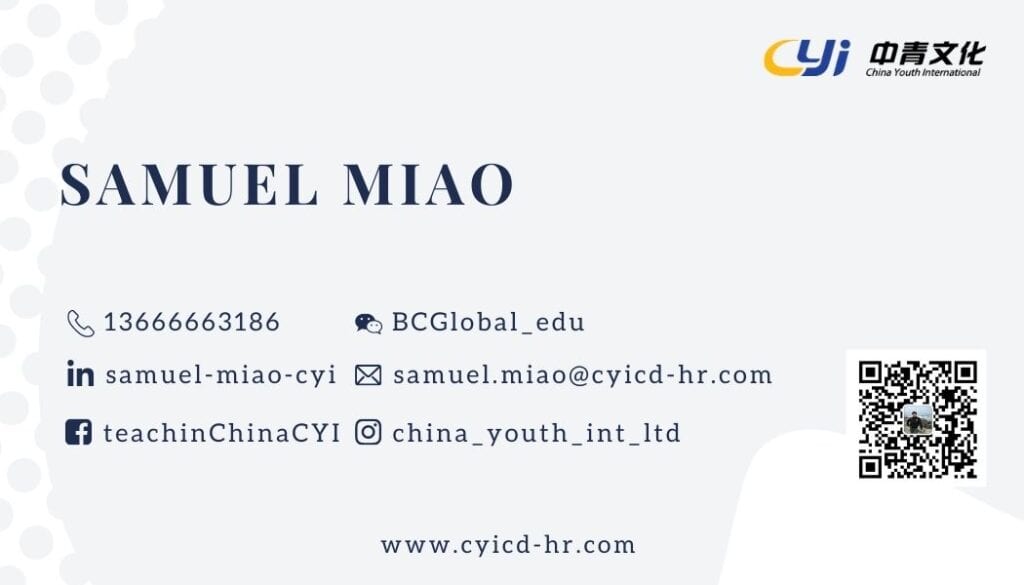You will be required to provide a “no criminal background check” authenticated by Chinese Embassy in the US for employment in China. Chinese local authority may or may not accept county level or state level background check, however, the FBI criminal history record (AKA FBI report) is widely accepted in China.

The FBI report needs to be authenticated by the US Department of State, then by the Chinese Embassy before it can used in China.
How to obtain the FBI report?
It’s actually quite simple. You may follow the steps below:
First of all, you will need to complete the applicant information form on FBI website.
https://www.fbi.gov/services/cjis/identity-history-summary-checks
Then you need to submit your fingerprints at participating U.S. Post Office locations or Express mail a completed fingerprint card along with a copy of your confirmation e-mail to FBI address in WV. You may also contact with one of the FBI-Approved Channelers to see if they can accept your fingerprints electronically.
https://bit.ly/33GMXZl
If you are already in China, please refer to the US Embassy website for information about local fingerprint services:
https://china.usembassy-china.org.cn/wp-content/uploads/sites/252/2017/05/Fingerprinting.pdf
Once the FBI receives your fingerprints, it only takes them 3-5 business days to generate the report. If you choose the digital version, you may download the report into PDF file once ready
What’s next?
There are 2 steps needed: the first is US Department of State authentication, the second is Chinese Embassy Authentication.
- US Department of State authentication step takes about 2 months to complete.
- Chinese Embassy authentication step takes another 3-6 weeks depending on the service level you choose.
We will cover both steps for you. The authenticated FBI report will be delivered to you by FedEx. In order for us to help you, please prepare your application according to the instruction below:
Item 1 – Authentication Application Form (G1)
Please fill out “Authentication Application Form (G1)” e-form version on your computer, print a hard copy.
FAQs:
Q: What should I fill in “Appendix and Copies of Notarization/ Legalization” section?
A: It simply means how many set of documents you need for authentication. If you only have 1 document, simply type in “1”. You will need to pay for each document that needs authentication.
Item 2 – Photocopy of Applicant’s Passport
- Photocopy of applicant’s passport. Please make a clear photocopy of your passport. Do not shrink or enlarge the size.
- Non-US passport holder needs to provide copy of legal US status such as US Permanent Residence Card copy or US student or residence visa copy.
Item 3 – Payment The authentication fees vary depending on service level
- Regular Service (up to 20 weeks processing): US$278.00/per document
- Express Service (12-16 weeks processing): US$338.00/per document
Above fees include US Department of State fee, Chinese Embassy fee, VisaRite service fee and return shipping fee by FedEx.
Remarks:
- Processing time means the time US Department of State and Chinese Embassy need to process your application and is based on business days. First day of receiving is not processing day. Weekend and holiday doesn’t count.
Forms of Payment:
- You may also pay by credit card online or offline. Credit card payment is subject to 3.6% surcharge.
- If you have paid online, please include a copy of payment confirmation with your application. Do not send in the credit card payment authorization form if you have paid online.
- Return shipping fee included is for return addresses within the continental U.S. If your return address is in Alaska, Hawaii, Puerto Rico or Canada, please include an extra extended delivery area fee of $10.00 per order. If you need to ship back to other international address, additional fee and time is needed, please call for detail.

Item 4 – Complete Online Service Request Form
- Please specify your service level and return address by submitting the service request form online.
- Please provide email address and phone so that confirmation and status update can be sent to you during the process.
Send the Application to VisaRite Service
Send your application to us via email
- The original FBI report downloaded from FBI website in PDF format.
- One clearly and completely filled “Application Form for Authentication” e-form version in PDF format.
- Scan copy of the applicant’s passport name page (complete page with name, photo, signature and barcode).
- Service request form confirmation page.
- Payment confirmation or credit card payment authorization form.






